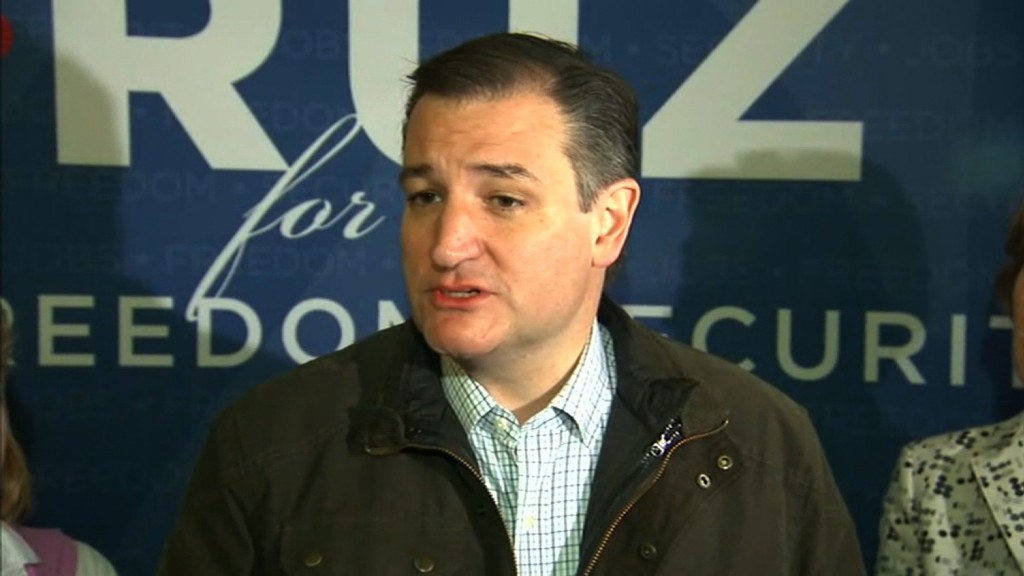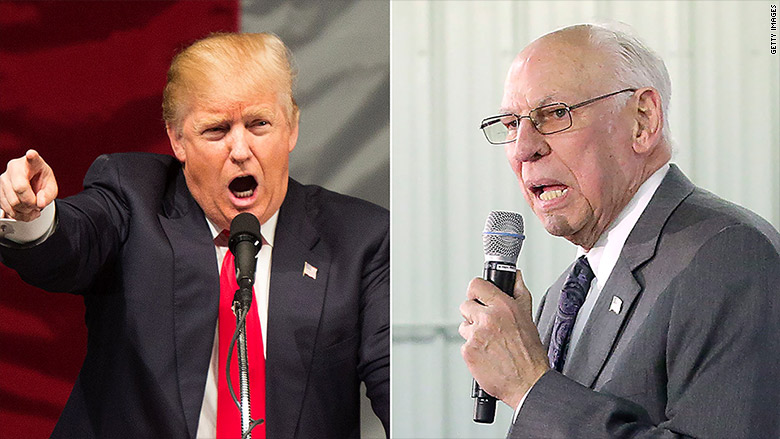
Donald Trump did it again on Tuesday, stating something from a highly questionable source as if it's fact.
In the past, his claims have come from fringe right-wing web sites and false social media memes. This time it is coming from the National Enquirer.
He credulously cited an Enquirer story about a link between Senator Ted Cruz's father and JFK assassin Lee Harvey Oswald.
No other news outlets have corroborated the alleged link. Cruz called it "nuts" on Tuesday. Hours later, after losing the Indiana primary, Cruz dropped out of the race, leaving Trump as the presumptive GOP nominee.
The reciting of unproven conspiracy theories has been a tactic of the Trump campaign since last summer. Trump has spoken of Muslims cheering the 9/11 attacks, a protester's imagined links to ISIS, and inflated numbers of Syrian refugees coming to America.
While other politicians have also been known to cite dubious statistics and tell exaggerated stories, the frequency of Trump's comments have kept fact-checkers uniquely busy, dating all the way back to the days that Trump promoted the "birther" conspiracy theory about President Obama.
New York Times reporter and CNN analyst Maggie Haberman tweeted on Tuesday that Trump "has often trafficked in conspiracy theories."
This newest controversy was ginned up in early April by a conspiratorial web site called the Wayne Madsen Report. Questions about Cruz's father then spread to like-minded sites like InfoWars.
By the end of April, it was on the front page of the Enquirer. The alleged proof includes a black and white photograph supposedly showing Rafael Cruz and Oswald together.
CNN has not independently confirmed the report.

During a phone interview on "Fox & Friends" Tuesday morning, Trump invoked the Enquirer claim without being asked about it and without citing the source.
Cruz's father "was with Lee Harvey Oswald prior to Oswald's being, you know, shot... And nobody even brings it up, I mean, they don't even talk about that," he said. "That was reported, and nobody talks about it. But I think it's horrible."
"What's horrible," conservative Trump critic Bill Kristol wrote later in the day, "is a leading presidential candidate trading in crackpot conspiracy theories."
Cruz responded to Trump at a press conference, saying, "Now, let's be clear, this is nuts." He sarcastically joked that "my dad killed JFK, he's secretly Elvis and Jimmy Hoffa is buried in his backyard."
Related: Cruz unloads with epic takedown of 'pathological liar,' 'narcissist' Donald Trump
The Enquirer has a checkered history, with some notable scoops over the years but many stories that have never panned out. It has repeatedly targeted Cruz in recent months.
Calling the publication "tabloid trash" on Tuesday, Cruz noted Trump's friendly relationship with its parent company's CEO David Pecker and said the Enquirer "has become his hit piece that he uses to smear anybody and everybody."
On ABC's "GMA" on Wednesday morning, Trump did not apologize for what Cruz called a "smear."
"All I did was refer to it," Trump said. "I'm just referring to an article that appeared. It has nothing to do with me."
He added: "The National Enquirer gave you John Edwards. It gave you O.J. Simpson. It gave you many, many things. I mean, you can't knock the National Enquirer. It's brought many things to light."
Why this matters
Where politicians get their information is important because they make statements and decisions based on the information.
Trump's tendency to cite sketchy sources of information suggests that he doesn't see a difference between, say, the Enquirer and The Wall Street Journal.
Media analysts know there are big differences between tabloids and robust newspaper newsrooms. But many voters might side with Trump — polls routinely show widespread distrust of the media writ large.
CNN commentator Tara Setmayer, a conservative critic of Trump, asked on a Tuesday morning newscast, "Is he going to start questioning the moon landing and aliens in Roswell next?"
In the past, Trump's sources of information have also included Internet rumors and clearly inaccurate stories. For example, the candidate's remarks last November about "cheering" crowds in New Jersey on 9/11 tracked very closely to stories that had circulated on the web for years.
The claims were thoroughly debunked. But Trump stood by his story about "thousands" of people celebrating, partly by citing what his fans told him on Twitter. At one rally, he said, "I'm getting all of these tweets: 'I saw it.' 'I was there.' 'I was this.' "
For Trump, Twitter and Facebook are instant feedback loops, giving him support for even the flimsiest assertions.
In March, after a protester rushed a rally stage while Trump was speaking, Trump tweeted that the man "has ties to ISIS," a far-fetched idea that had been promoted by an obscure pro-Trump web site. Trump also shared a video that showed the protester in front of an ISIS flag.
But "all signs point to the video Trump tweeted being either a hoax or an effort to troll" the protester, PolitiFact reported the next day.
On NBC's "Meet the Press," Chuck Todd repeatedly told Trump that the alleged connection to ISIS was a "hoax," adding, "Somebody made that up, sir."
Trump eventually told Todd, "All I know is what's on the Internet."
Keeping fact-checkers uniquely busy
The connections between some of Trump's claims and the darker corners of the web have caused consternation even among prominent conservative figures.
The candidate has been criticized on several occasions for sharing incendiary and fraudulent information on Twitter. In November, for instance, he retweeted fake crime statistics that wrongly attributed the vast majority of homicides to blacks.
"I retweeted somebody that was supposedly an expert," Trump told a disappointed Bill O'Reilly afterward. Nothing about the graphic or the person's Twitter profile suggested expertise.
When pressed by O'Reilly on the accuracy of the statement, Trump replied, "Bill, am I going to check every statistic?"
Glenn Kessler, the Fact Checker columnist for The Washington Post, said he has noticed Trump's propensity for gleaning information from Internet rumors.
"Trump has gotten more four Pinocchio ratings than any other candidate in part because of that," Kessler said.
Kessler's blog, PolitiFact, FactCheck.org, Snopes, and other sites try to hold politicians accountable.
PolitiFact editor-in-chief Angie Holan, whose site has reviewed dozens of Trump assertions, said he "does say some things that are Internet rumors."
As an example, she cited PolitiFact's very first fact-check of Trump, back in 2011, titled "Donald Trump says people who went to school with Obama never saw him."
Trump was quoted at a conservative political conference as saying that "the people that went to school with him, they never saw him, they don't know who he is. It's crazy."
PolitiFact ruled it to be a "pants on fire" untruth. But versions of the claim have zipped around anti-Obama message boards and email threads for years.
Holan said, "That's straight off the Internet. That's not true."
Other times, Trump's sources are conservative news sources that turn out to be wrong. In November he recorded an Instagram video saying that "Syrians are now being caught at the southern border! Just like I said. They're going to be pouring in. We don't know who they are. Could be ISIS."
The original source was Breitbart.com, which had reported that eight Syrians had been "caught" in Laredo, Texas. In fact, the eight Syrians — two families of four — had turned themselves in to the authorities.
In September Trump started to say that he was hearing President Obama wants to "take in 200,000 Syrians." He later revised the number up to 250,000.
The Obama administration is actually seeking to resettle 10,000 Syrian refugees, and it is unclear where Trump heard otherwise. But PolitiFact noted that a fake web site called RealNewsRightNow.com posted an article in September headlined "U.S. to House 250,000 Syrian Refugees at Navajo, Standing Rock Indian Reservations."
The site seeks to trick people into believing and sharing its fake news.
In March Trump campaign manager Corey Lewandowski tweeted a story from another hoax site. He deleted it several hours later.


